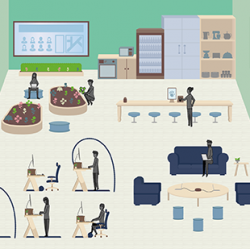February 17, 2017
Employees demand end to rigid structures and siloed working practises 0
 Employees would like more freedom and flexibility at work with over half believing that the structure and culture of their workplaces are holding them back from doing their job more effectively (55 percent and 53 percent respectively). That’s according to new research from ILM, which has launched a new report calling for workplaces across the UK to foster a more collaborative culture in order to boost business success. The research found that more than a third (34 percent) of UK employees felt they worked in a regulated and controlled structure. When asked how they’d like to change their company culture, the top answer was more freedom and flexibility (35 percent) followed by more innovation and creativity (32 percent). Three quarters (74 percent) of employees say they would like more freedom at work. Although employers tend to agree with the need for teams to have more freedom, with two in five (40 percent) saying they’d like a more flexible culture, more would prefer to champion innovation and creativity (46 percent), indicating a disconnect between the way that businesses and their people are keen to work.
Employees would like more freedom and flexibility at work with over half believing that the structure and culture of their workplaces are holding them back from doing their job more effectively (55 percent and 53 percent respectively). That’s according to new research from ILM, which has launched a new report calling for workplaces across the UK to foster a more collaborative culture in order to boost business success. The research found that more than a third (34 percent) of UK employees felt they worked in a regulated and controlled structure. When asked how they’d like to change their company culture, the top answer was more freedom and flexibility (35 percent) followed by more innovation and creativity (32 percent). Three quarters (74 percent) of employees say they would like more freedom at work. Although employers tend to agree with the need for teams to have more freedom, with two in five (40 percent) saying they’d like a more flexible culture, more would prefer to champion innovation and creativity (46 percent), indicating a disconnect between the way that businesses and their people are keen to work.







 Nearly three quarters of European employees would consider career opportunities abroad, with Germany voted the most desirable place to work claims a new study of nearly 10,000 working adults across Europe. According to research by ADP which looked at how employees feel about the future of work, international competitiveness and talent management, European employees have a strong appetite for international work, as almost three quarters (74 percent) would consider other countries for career opportunities. At 21 percent, Germany tops the list of most popular places to relocate, with the United Kingdom (15 percent) and France (12 percent) in second and third place; with North America surprisingly coming in much further down the list in 12th place. Despite their popularity, Germany, the UK and France aren’t particularly strong in any of the areas measured in the survey, such as skills and development, flexible working options and stress in the workplace.
Nearly three quarters of European employees would consider career opportunities abroad, with Germany voted the most desirable place to work claims a new study of nearly 10,000 working adults across Europe. According to research by ADP which looked at how employees feel about the future of work, international competitiveness and talent management, European employees have a strong appetite for international work, as almost three quarters (74 percent) would consider other countries for career opportunities. At 21 percent, Germany tops the list of most popular places to relocate, with the United Kingdom (15 percent) and France (12 percent) in second and third place; with North America surprisingly coming in much further down the list in 12th place. Despite their popularity, Germany, the UK and France aren’t particularly strong in any of the areas measured in the survey, such as skills and development, flexible working options and stress in the workplace.



























